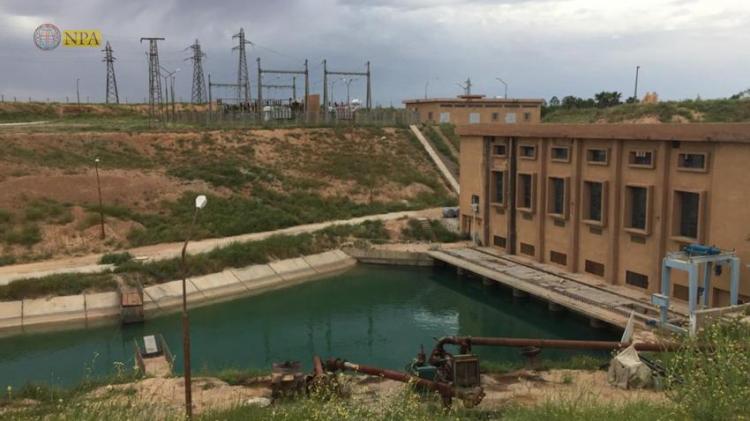The biggest pumps are out of service in the western countryside of Raqqa
Prior to the beginning of the crisis of March 2011, the Syrian government constructed two drinking water stations at the main canal of ( Al-Belikh) in the western countryside of Raqqa, Abu Gedi and Al-Zahria stations, that were watering more than 85,000 people.
The two stations had been destroyed during the battles of the Syrian Democratic Forces against ISIS to control the area.
Abu Gedi Station
Abu Gedi station supplies more than 20 villages with drinking water, and benefits about 15,000 people. However, ISIS entrenched there during the battles that led the destruction of the station.
The residents of these villages suffer from the difficulty of getting drinking water, because it is a desert area and far from the irrigation canals.
Muhammad Al-Ali, a resident of Al-Kurmanji village told North Press that after the station got out of service, they had to buy water from the reservoir at very high prices.
In addition to the high prices, they are unreliable, Al-Ali pointed out, “we do not know the source of water, and it caused some diseases, especially to children, such as diarrhea and fatigue.”
Hence, Al-Ali warns that the problem will be exacerbated if the authorities and the relevant organizations would not rehabilitate the water station to provide sterile water.
Here, Abu Gedi station is administratively operated by the Water Foundation in Altabqa town, and the reasons for delaying the rehabilitation are explained by the Engineer Ahmed Al-Ahmad, who pointed out to North Press that the station needs four pumps at a cost of 25.000 USD per pump, in addition to the cost of construction, which may reach up to 30.000 USD, mentioning the plan of rehabilitating the station during this year.
Al-Zahira- Station
Although it was partially destroyed by car bomb of ISIS, yet, Al-Zahria station is better than the previous one.
Raqqa Civil Council rehabilitated Al-Zahria station at the beginning of 2018 with the support of the Early Recovery Team.
At the same time, it also has difficulties, the water station person in charge Ismail Al-Hasan, cleared to North Press, “We suffer from the filter tanks which are out of service because of the lack of water-filtration materials in the area. Therefore, we sterilize the water, directly, through a chlorine tank of a 1000-liter capacity, which pours into the main tank of the station, we also suffer from a weak of electricity.
The reconstruction committee of the Raqqa Council worked to avoid all the previous problems and repair the damages, said the Ismail Al-Hasan.
Al-Hasan added that the station supplies more than 70,000 people with water. It is considered one of the biggest drinking water stations in the western countryside of Raqqa. It also supplies the station of Ein Issa with water to reach Bagdeek village, at the Turkish border in the north.
Al-Zahira station consists of nine main pumps, with different capacities, over an area of 2500 m2, on three sides, Ein Issa in the north, Al-Darubiya village in the west, Ruyan village and Tishreen farm in the south.
Al-Hassan explained that the station is currently operating by the electricity supply, and because of its weakness, they operate the stations alternately on the three sides of the pumping lines.”
It is worth to mention, that there are many pumps in the countryside of Raqqa still need maintenance to function again.
Ahmed Al-Hasan – NPA

